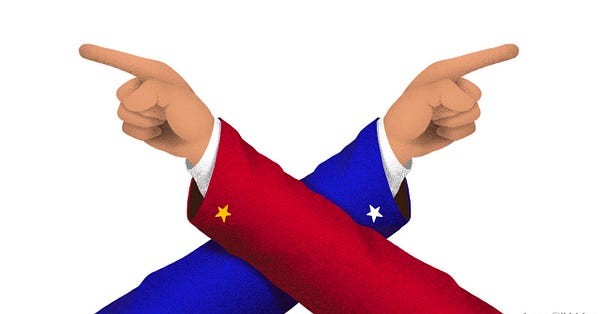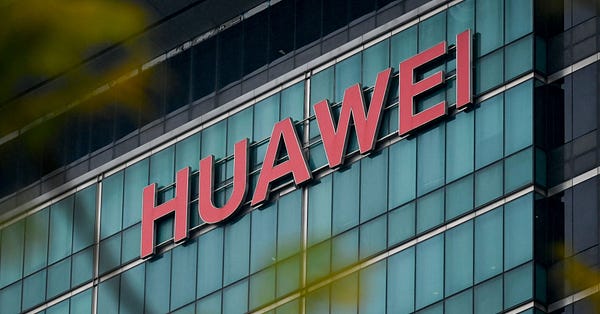With the Trump decision to take action against TikTok and more Chinese tech companies we are seeing Washington and Beijing move towards an even more serious tech war. Some analysts are suggesting it could backfire.
Meanwhile, more reports are emerging suggesting the Chinese economic recovery is only benefitting one privileged slice of its companies and people, and warning it is unlikely to last. Welcome to Newsletter 31, this week’s edition of Trade War.
TikTok and “a very American company”
Trump on Friday set off a “furious scramble” when he said he would ban TikTok’s operations but now Microsoft has emerged as a possible buyer, reports Bloomberg News.
“I don’t mind whether it’s Microsoft or someone else, a big company, a secure company, a very American company buys it,” Trump told White House reporters on Monday. “It’ll close down on Sept. 15 unless Microsoft or somebody else is able to buy it and work out a deal, an appropriate deal, so the Treasury of the United States gets a lot of money.”

Path of techno-nationalism
Some are criticizing Trump’s decision to follow China’s lead and start banning foreign tech companies while others support it. “This sets a dangerous precedent for the U.S.,” Samm Sacks, a fellow on cybersecurity policy at the New America think tank told Bloomberg News. “We are moving down a path of techno-nationalism.”
“The Trump administration’s threat to ban ByteDance Ltd.’s viral teen phenom and other Chinese-owned apps could significantly hamper their access global user data, which is an immensely valuable resource in a modern internet economy,” Bloomberg reports.
“Some decry the betrayal of values like free speech and capitalism, while others advocate doing whatever it takes to subdue a geopolitical rival and its pivotal tech industry.”
Richard Nixon went to China
The Economist weighs in with a warning on the U.S.-China downward spiral writing “as a presidential election draws near, the potential for dangerous miscalculation is growing.”
The British magazine also moves the marker back another decade in how long it has been since we’ve seen such a bad relationship: “The two distrust each other more now than at any point since Richard Nixon went to China almost 50 years ago.” (Before everyone was saying the relationship was as bad as back during Tiananmen Square in 1989.)


So are we winning?
So how has the Trade War treated the U.S. and its interests to date, ask Ryan Haas and Abraham Denmark in a commentary for SupChina. Answer: not very good at all. The trade war has “significantly hurt the American economy without solving the underlying economic concerns that the trade war was meant to resolve,” the two authors write.
“The effects of the trade war go beyond economics, though,” they continue, and have “produced a more permissive environment for China to advance its interests abroad and oppress its own people at home, secure in the knowledge that American responses would be muted by a president who was reluctant to risk losing the deal.”
(That’s what Pompeo’s book suggested of course, with Trump reportedly giving the Chinese a pass on Hong Kong and Xinjiang in order to help him get a trade deal and win the election.)


Chile snubs Huawei in underseas cable
Huawei has just been dealt a blow in its global business with the decision by Chile to opt for a Japanese transpacific undersea fiber optic cable over the Chinese company, writes Nikkei Asian Review.
“Japan's route beat out a pitch by China that would have made Shanghai the final landing point. This decision comes amid a U.S. pressure campaign to keep China out of global telecommunication projects.”


Makes the United States safer?
Scott Kennedy of CSIS has written an interesting piece on Huawei and decoupling that has been praised by some and criticized by others (the mark of a good commentary).
He starts by pointing out that “no one should minimize the dangers it presents to the United States,” citing problems with stolen intellectual property, the fact that Huawei has been supported by massive state funding which allows it to beat competitors, has violated trade sanctions against Iran, and that adopting its technology may allow the Chinese government to monitor people not just at home but abroad, particularly as the use of 5G expands.
Kennedy then goes on to write that “having Huawei and other Chinese firms integrated into U.S.-led ecosystems is not just smart business, it also makes the United States safer. China is less likely to make radical advancements or place backdoors in its silicon when its products are rooted in our foundational technologies.” (this not surprisingly, is where the controversy has been generated.)


Why China’s economic recovery won’t last
Another report has been published pointing out the uneven nature of China’s reported second quarter growth of 3.2 percent. The Paulson Institute’s Houze Song writes that what appears “an impressive rebound” from the first three months “is both uneven and unlikely to endure.”
“Not only have high-wage sectors benefitted more from the stimulus, the pandemic has also disproportionally affected labor-intensive, low-wage sectors, thereby widening the gap in recovery.”
Bigger blow on lower-income population
The uneven nature of the recovery is is hurting “people at the lower end of the country’s income ladder, including migrant workers and those working in the sectors hit the hardest by the outbreak, such as catering and retail sales,” shows a report by CICC economists, Bloomberg News reports.
“Migrant workers’ monthly wages contracted by 6.7% in the second quarter, even though disposable income growth nationwide recovered to 4.5% in the period.”


Come back to the TPP
Singapore’s Prime Minister Lee Hsien Loong makes a call for the U.S. to reengage in trade in the Asia-Pacific, in this address to the Atlantic Council.


Unfavorable view of China
A new survey shows a collapse in U.S. perceptions of China, with about three-quarters putting “a great deal or fair amount of the blame for the global spread of the coronavirus on the Chinese government’s initial handling of the COVID-19 outbreak in Wuhan.”
“Around seven-in-ten (68%) say current economic ties between the superpowers are in bad shape – up 15 percentage points since May 2019” according to the survey published on July 30 by Pew Research.


Notable/In Depth
Good piece by Atlantic Council nonresident senior fellow Ali Wyne examining the now popular notion that somehow the U.S. policy of engagement "lost" China.


Enjoyed talking about how 300 million migrant workers have a more important role in modern China than former McKinsey consultants starting Internet companies, in this podcast with Richard McGregor, author of classic China book The Party: The Secret World of China's Communist Rulers.


In which I discuss how China once gladly turned to the US for reform advice but how that has so markedly changed today. Video of my recent conversation with Indian media company Internationalism Editorial.
Audio version of ‘The Myth of Chinese Capitalism’
And I’m pleased to announce that audio version of The Myth of Chinese Capitalism has been released. You can get it here.





